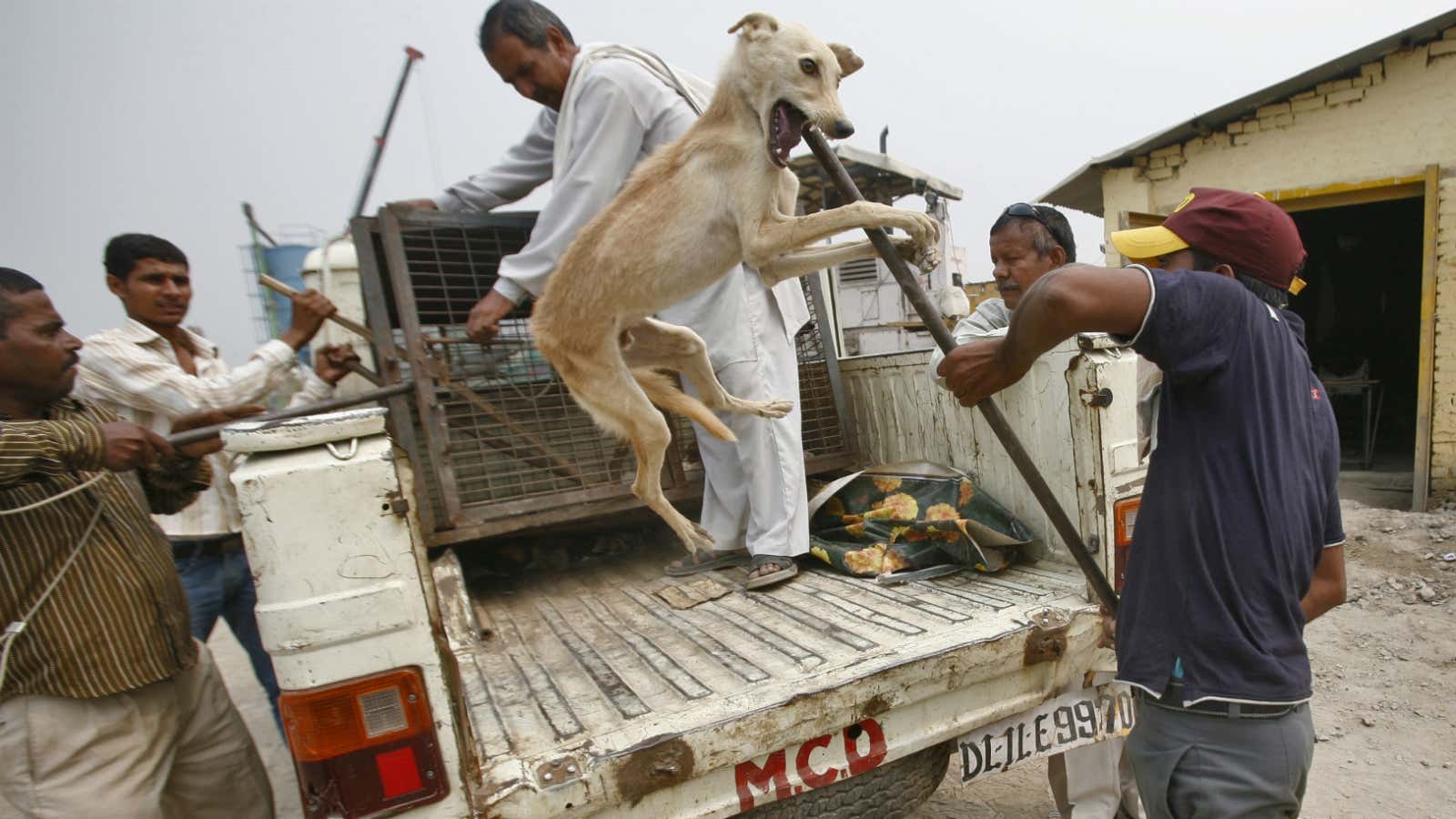Ammu was heartbroken.
Eight of her little ones—all of 15 days old—were picked up one by one and smashed to death on a boulder on March 15.
After they were buried by residents of her Bengaluru locality, Ammu anxiously dug them out again and tried to nurse them. When they didn’t respond to her whimpers and coaxing, she picked one of them and approached a local for help. He couldn’t bear to see her pain. Neither could he help her.
For a week after that, the stray mongrel was seen guarding her eight puppies’ grave.
Residents could hear her howl and wail all through. A police complaint was filed against Ponnamma, the 55-year-old widow who had inexplicably flung the puppies to death. She was arrested and released on bail. If convicted, Ponnamma could be jailed for up to five years, besides being fined.
“She remains remorseless and promises to repeat her heinous act if necessary,” K B Harish, one of the complainants, said. “This is not the first time such an incident has taken place. I have seen cases where dogs were bludgeoned with iron bars and puppies were burnt alive. Such cases take place almost every month,” Harish, an animal cruelty inspector authorised by Animal Welfare Board of India (AWBI), said.
AWBI is a statutory body advising the government of India on animal welfare laws.
For years, Bengaluru has grappled with the problem of its stray dogs—estimated at around 200,000, according to Harish. While on one side, there are instances like Ammu’s, where entire neighbourhoods have come out in support, in other areas of the same city, citizens have had serious issues with mongrels. Cases of dog bite and mauling have, though, been steadily decreasing in the city.
Such wanton violence towards stray dogs, however, is not restricted to one city either.
According to recent media reports, a “serial killer” of dogs is on the prowl in New Delhi. A case of cruelty to animals was filed against the unidentified person in March. A CCTV camera caught him stabbing puppies.
According to some estimates there were 30 million stray dogs in India in 2015. The Indian Journal of Medical Research says 17.4 million dog-bites are reported every year, leading to between 18,000 to 20,000 deaths due to rabies. The problem—at least in some regions—is so serious that the provincial governments and even the supreme court of India have had to step in.
A complaint in this regard from the southern coastal state of Kerala has reached the apex court. Earlier this month, the court ruled that the state and local governments must be held responsible for stray dog bites and will be liable to compensate victims.
According to the complainant, Kerala alone reports more than 100,000 cases of dog bites every year.
“There have been frequent incidents of stray dogs chasing, attacking and biting school children, aged persons, pedestrians, morning walkers, two-wheeler riders. Increase in stray dog population… has created panic among the people,” Aluva Janaseva, the NGO that filed the complaint, said, according to The Times of India newspaper.
Yet, there are also those advocating a humane approach to the problem, rather than moves such as mass culling—which usually involves strychnine (a highly toxic alkaloid) poisoning or electrocution—to reduce the canine population.
“For the past two decades we have rounded up strays, sterilised them, ensured they are rabies-free and returned them to their original localities. All this at a rate of 500-600 dogs per month,” said Shilpa Mahbubani of Compassion Unlimited Plus Action (CUPA), a public charitable trust in Bengaluru working for welfare of animals.
“There are 4-5 other such organisations and individuals working in this field in Bengaluru, because of which there have been no cases of rabies reported in the past three years,” Mahbubani said.
In Hisar town of the northern Indian state of Haryana, over 92,000 dogs were sterilized and/or vaccinated in the past year as part of a first-of-its-kind National Rabies Control Program by the Humane Society International (HSI), another NGO that works for street and farm animals.
With one year remaining in its program, HSI plans to open new sterilization centres in other Haryana towns such as Jind and Bhiwani and sterilize an additional 50,000 dogs and vaccinate another 180,000.
According to a press release from HSI, the supreme court itself had earlier issued orders, directing authorities to tackle dog population through humane animal birth control protocols. These orders came after repeated reports of dog culling and dog abuse across India.
Besides institutions and organisations, very often individuals too take it upon themselves to “take care” of dogs in their locality. Often, this too has evoked the wrath of others.
In Ammu’s case, according to Harish, someone flew down from Delhi to adopt her after reading about her plight in the media. But her caretakers have refused part with her.
